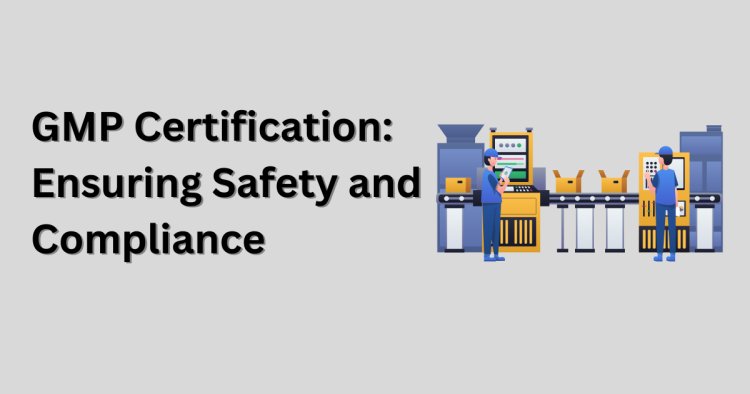GMP Certification: Ensuring Safety and Compliance
GMP certification is a formal recognition by a regulatory body that a manufacturing facility, process, or product meets the established Good Manufacturing Practices (GMP) requirements.
Share this Post to earn Money ( Upto ₹100 per 1000 Views )

GMP Certification: Ensuring Safety and Compliance
Good Manufacturing Practices (GMP) are regulations that ensure the quality and safety of products produced in regulated industries such as pharmaceuticals, food, and medical devices. They cover all aspects of production, from the quality of raw materials to the storage and distribution of finished products. GMP certification is a formal recognition by a regulatory body that a manufacturing facility, process, or product meets the established GMP requirements. It is not mandatory, but it can be a valuable asset for manufacturers, as it demonstrates their commitment to quality and safety and can facilitate market access and regulatory approvals.
Benefits of GMP Certification
There are several benefits to obtaining GMP certification, including:
- Enhanced market access: Many regulatory agencies and customers require or prefer GMP-certified suppliers. This can open up new markets and business opportunities for manufacturers.
- Increased credibility and reputation: GMP certification demonstrates a commitment to quality and safety, which can boost a company's reputation in the eyes of customers and investors.
- Reduced regulatory risk: GMP certification can help to reduce the risk of regulatory sanctions or product recalls. This can save manufacturers time, money, and reputational damage.
- Improved operational efficiency: Implementing GMP can lead to improved process control and consistency, which can reduce waste and improve efficiency.
Process of Obtaining GMP Certification
The process of obtaining GMP certification typically involves the following steps:
- Gap analysis: The manufacturer conducts a gap analysis to identify any areas where their current practices do not meet the GMP requirements.
- Develop a Quality Management System (QMS): The manufacturer develops and implements a QMS that meets the requirements of the relevant GMP regulations.
- Documentation: The manufacturer prepares all of the necessary documentation, such as standard operating procedures (SOPs), training records, and calibration records.
- Audit: A qualified certification body conducts an audit of the manufacturer's facility, processes, and documentation.
- Certification: If the audit is successful, the certification body will issue a GMP certificate.

GMP certification is a valuable tool for manufacturers who want to ensure the quality and safety of their products, gain market access, and reduce regulatory risk. While it is not mandatory, it is becoming increasingly important in today's competitive global market.
Other services provided by Corpseed







